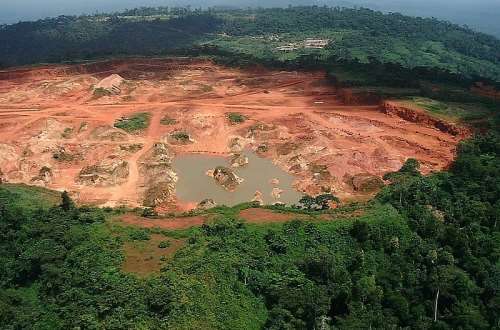Galamsey has once again returned to the forefront of Ghana’s national conversation, this time through the lens of law and policy.
The IMANI Center for Policy and Education (IMANI Africa) has weighed in on the government’s recent decision to repeal both L.I. 2462 and its amendment, L.I. 2501, warning that while the move may streamline governance, it could also create unintended gaps in environmental oversight and licensing.
What began in 2019 as a tightly focused subsidiary legislative instrument aimed at regulating mining activities in forest reserves has now evolved into a contested legal battleground. The government insists that the repeal does not weaken Ghana’s arsenal against illegal mining, popularly known as galamsey.
Officials argue that no regulatory vacuum will result, maintaining that existing statutes such as the EPA Act, the Minerals and Mining Act, and the Forestry Commission Act already provide robust tools for enforcement, permitting, and remediation.
The journey to this moment has been complex. L.I. 2462 was originally designed to impose explicit restrictions on mineral exploitation within forest reserves. It granted the President an exceptional power to approve mining projects deemed to serve the national interest.
That framework changed three years later when L.I. 2501 revised the rules. This amendment removed the presidential override, redirected licensing authority to the Environmental Protection Agency (EPA) and the Minerals Commission, and introduced stronger conservation-oriented provisions.

“In theory, these amendments strengthened inter-agency coordination and tightened rehabilitation bonds, but they also generated fresh friction over institutional mandates and the EPA’s role.
“Fast forward to today, and the government is preparing to strip away both regulatory layers entirely. Proponents argue that the primary statutes, the EPA Act, the Minerals and Mining Act, and the Forestry Commission Act already furnish comprehensive powers for permitting, enforcement, and remediation.”
IMANI Center for Policy and Education (IMANI Africa)
From the perspective of government officials, the repeal is a housekeeping exercise.
The acting Minister for Lands and Natural Resources has described it as the removal of redundant text rather than the withdrawal of substantive powers. In their view, the machinery of enforcement remains intact and functional.
Fears Of A Legal Void Amid Galamsey Fight
IMANI Africa, however, remains skeptical. The policy think tank cited its March 2025 Civil Accountability Governance Index (CAGI), which recalls warnings from the late Environment Minister that a full repeal could hollow out the EPA’s jurisdiction over forest-reserve mining.
Officials had justified the change partly on grounds of preserving investments worth over ¢4 billion tied to already licensed companies.
With both L.I. 2462 and L.I. 2501 out of the picture, IMANI asks: which rules would ensure site audits, reclamation bond enforcement, or community restitution claims?
Without transitional clauses, both regulators and mining operators may find themselves navigating uncharted legal waters.

IMANI explained that although the EPA retains general authority to demand environmental impact assessments and levy fines, the Minerals Commission’s licensing powers apply primarily outside forest reserves.
The Forestry Commission, while tasked with protecting forest resources, does not have specific mining protocols for reserves. This lack of a dedicated framework could unravel the coordinated system that L.I. 2501 attempted to institutionalize.
“This fragility is more than theoretical. Pending permit applications could languish unprocessed, existing licences may enter legal limbo, and enforcement athletes, from bonding to on-site inspections, could find themselves without a statutory playbook. Local communities poised to hold operators accountable might lose formal channels for affected-area monitoring and restitution, creating openings for renewed ‘galamsey’ incursions.”
IMANI Center for Policy and Education (IMANI Africa)
For IMANI, the danger is not abstract. The think tank pointed to regional precedents where sweeping legal reforms created chaos when transitional safeguards were overlooked.
Lessons From Africa’s Mining Reforms
The think tank referenced Mali’s Law No. 2023-040 gold-royalty reforms and Burkina Faso’s 2016 mining code overhaul.
In Mali, the absence of clear guidelines left projects at the Loulo–Gounkoto mining complex stranded, pushing Barrick Gold into international arbitration.
Similarly, Burkina Faso’s rapid reforms triggered investor unease and treaty claims until emergency regulations clarified administrative procedures.

These examples, IMANI noted, demonstrate the risks of repeal without replacement. Investors and regulators require predictable frameworks, and without them, both environmental protection and economic stability are jeopardized.
“Repealing L.I. 2462 and L.I. 2501 offers the promise of streamlined governance and reinvigorated primary statutes. But without deliberate, phased replacement measures, Ghana risks leaving its forest reserves, and the soaring momentum against galamsey in regulatory limbo.”
IMANI Center for Policy and Education (IMANI Africa)
Ultimately, the outcome will depend on what follows this bold legal reset. Will the government introduce new instruments to plug the gaps, or will Ghana’s fight against galamsey be weakened at a critical juncture?
For now, civil society, policymakers, and local communities are watching closely, knowing that the stakes involve not just regulatory clarity but the survival of Ghana’s forest heritage.
READ ALSO: Fidelity Bank Splashes GH¢500K on Creative Entrepreneurs at 3rd Sustainability Conference























